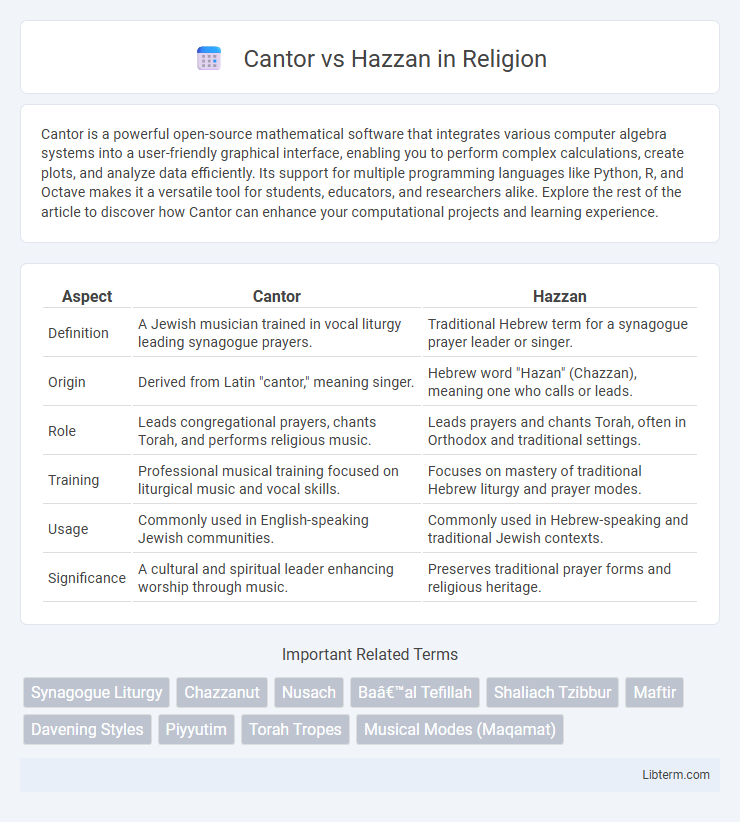Cantor is a powerful open-source mathematical software that integrates various computer algebra systems into a user-friendly graphical interface, enabling you to perform complex calculations, create plots, and analyze data efficiently. Its support for multiple programming languages like Python, R, and Octave makes it a versatile tool for students, educators, and researchers alike. Explore the rest of the article to discover how Cantor can enhance your computational projects and learning experience.
Table of Comparison
| Aspect | Cantor | Hazzan |
|---|---|---|
| Definition | A Jewish musician trained in vocal liturgy leading synagogue prayers. | Traditional Hebrew term for a synagogue prayer leader or singer. |
| Origin | Derived from Latin "cantor," meaning singer. | Hebrew word "Hazan" (Chazzan), meaning one who calls or leads. |
| Role | Leads congregational prayers, chants Torah, and performs religious music. | Leads prayers and chants Torah, often in Orthodox and traditional settings. |
| Training | Professional musical training focused on liturgical music and vocal skills. | Focuses on mastery of traditional Hebrew liturgy and prayer modes. |
| Usage | Commonly used in English-speaking Jewish communities. | Commonly used in Hebrew-speaking and traditional Jewish contexts. |
| Significance | A cultural and spiritual leader enhancing worship through music. | Preserves traditional prayer forms and religious heritage. |
Introduction to Cantor and Hazzan
Cantor and Hazzan both refer to the person who leads Jewish liturgical music, serving a vital role in religious services by chanting prayers and guiding congregational singing. The term "Cantor" is commonly used in English-speaking communities, while "Hazzan" is derived from the Hebrew word Hzn, meaning "elevator" or "leader in worship," reflecting the traditional origins of this role. Both titles emphasize the importance of musical and spiritual leadership within synagogue worship, with responsibilities including prayer chanting, religious melodies, and sometimes teaching liturgical music.
Defining the Role of a Cantor
The role of a Cantor, as defined in Cantor vs Hazzan, centers on leading liturgical music and enhancing communal worship through specialized vocal and musical skills. A Cantor serves as a spiritual leader responsible for chanting prayers, guiding congregational singing, and preserving Jewish musical traditions. This case emphasizes the Cantor's function as both a religious official and a cultural custodian within the synagogue setting.
Understanding the Hazzan: Origins and Duties
The Hazzan, rooted in ancient Jewish traditions, serves as the synagogue's prayer leader and spiritual guide, entrusted with chanting liturgical melodies and facilitating congregational worship. Originating from the Hebrew word "chazan," meaning "to behold" or "to attend," the role evolved to emphasize musical expertise and pastoral responsibilities within Jewish communities. Duties of the Hazzan include leading prayers, teaching nusach (traditional modes of prayer), and providing emotional support during religious ceremonies, distinguishing this role from the purely musical functions of a Cantor.
Historical Evolution: Cantor vs Hazzan
The terms Cantor and Hazzan both refer to the clergy member leading Jewish liturgical music, with Hazzan originating from the Hebrew word meaning "one who presides." Historically, Hazzan emphasized a more traditional role focused on chant and prayer leadership in synagogue services, while Cantor has evolved in many communities to include broader musical training and performance elements. Over time, the role of Cantor has modernized, incorporating formal seminary education and professional status, reflecting changes in both liturgical style and community expectations.
Musical Training and Qualifications
Cantors typically undergo extensive musical training in vocal performance, sacred music, and liturgical traditions, often at specialized institutions or conservatories. Hazzans, also known as cantors in certain traditions, combine rigorous musical education with deep knowledge of religious texts and Hebrew cantillation. Both roles require formal qualifications that emphasize vocal technique, musical interpretation, and spiritual leadership within Jewish worship.
Liturgical Responsibilities Compared
Cantor and hazzan both serve as prayer leaders in Jewish worship, with the hazzan traditionally focusing on leading congregational prayers and chanting Torah cantillations. Liturgical responsibilities of the cantor often include directing musical aspects of the service, training choir members, and enhancing the spiritual experience through melodic interpretation. While both roles share common functions, the cantor may have broader duties related to music education and liturgical innovation within the synagogue.
Cultural and Denominational Differences
Cantor and Hazzan represent distinct roles within Jewish liturgical tradition, with "Cantor" commonly used in Reform and Conservative movements, while "Hazzan" is the traditional Hebrew term prevalent in Orthodox communities. These terms reflect underlying cultural and denominational differences, as Cantors often incorporate contemporary musical styles and personal interpretation, whereas Hazzans maintain a strict adherence to traditional nusach and chant. The variation highlights divergent approaches to worship, balancing innovation and preservation across Jewish denominations.
Community Impact: Cantor vs Hazzan
Cantors and hazzans both serve vital roles in Jewish worship, leading liturgical music and prayer, yet their community impact varies by tradition and context. Cantors often engage deeply with congregation education, lifecycle events, and outreach, reinforcing communal bonds through personalized spiritual leadership. Hazzans typically emphasize musical expertise and ritual precision, fostering communal identity and continuity within more traditional or Orthodox settings.
Modern Adaptations in Jewish Worship
Cantor vs Hazzan roles in Jewish worship have evolved with modern adaptations that emphasize inclusivity and contemporary musical styles. Digital innovations like live streaming and multimedia services enable cantors and hazzans to reach wider audiences beyond traditional synagogue settings. This shift integrates traditional liturgical melodies with modern genres, enhancing engagement and spiritual connection in diverse Jewish communities.
Choosing Between a Cantor and a Hazzan
Choosing between a cantor and a hazzan depends on the specific liturgical needs and community traditions, as both roles involve leading Jewish prayer services and chanting sacred texts. Cantors often have formal musical training and may perform a broader range of vocal duties, while hazzanim typically emphasize traditional cantillation and religious instruction within Orthodox or Conservative congregations. Assessing factors such as synagogue denomination, musical style, and congregational expectations ensures the best fit for spiritual leadership and worship experience.
Cantor Infographic

 libterm.com
libterm.com